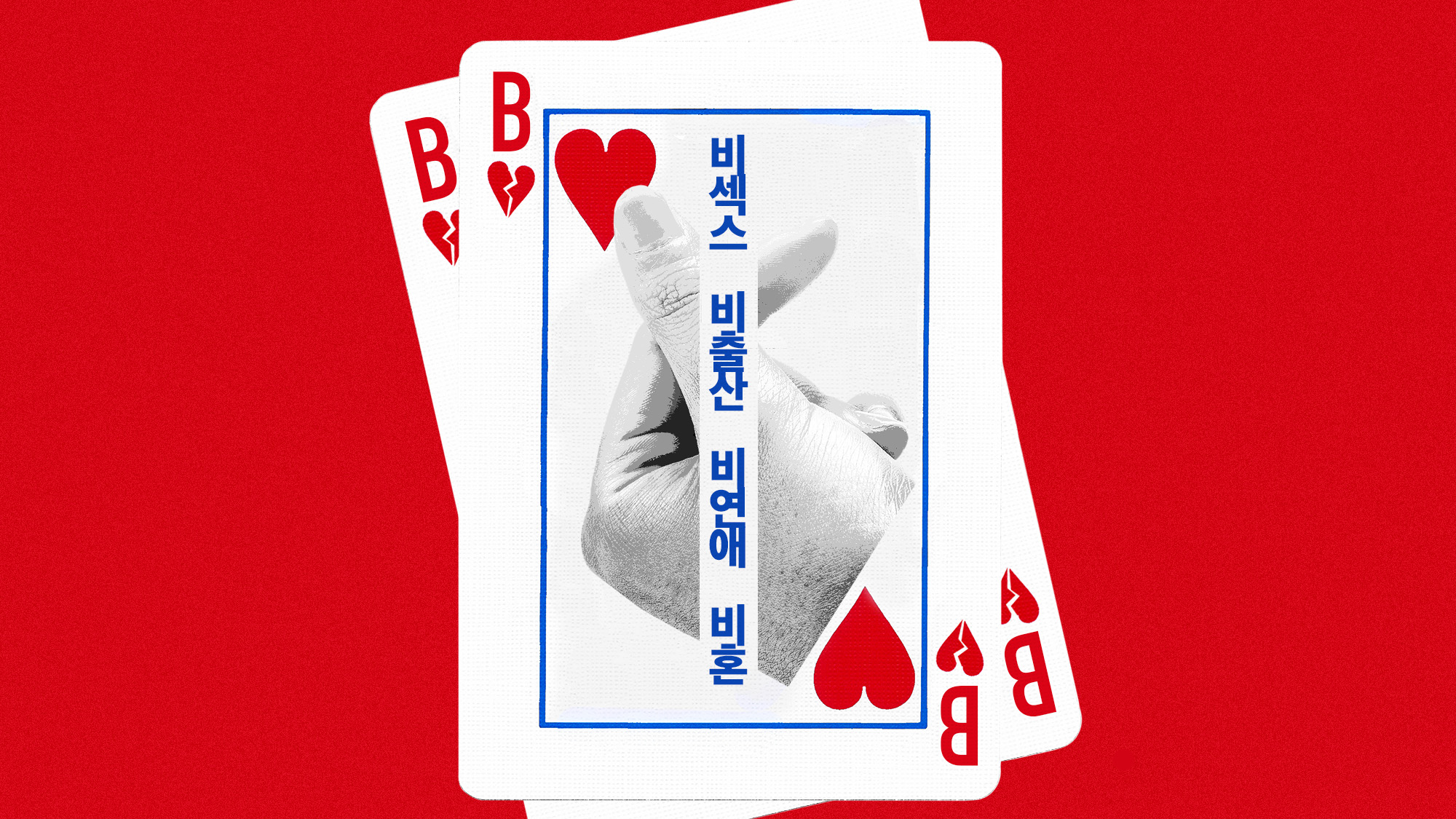4B movement: what is it and how has it evolved?
Why some women are choosing the nuclear option for dealing with misogyny

A free daily email with the biggest news stories of the day – and the best features from TheWeek.com
You are now subscribed
Your newsletter sign-up was successful
A radical feminist campaign to respond to gender inequality and violence against women by swearing off sex, dating, marriage and babies is gaining traction with young women around the world. The 4B movement, which began in South Korea a decade ago as a protest against pervasive misogyny, has since spread to the US and China.
Contrary to some media depictions, “it is crucial to understand that 4B is not about rejecting men for the sake of it” but about “rebalancing power in a world where power is skewed against women”, said gender equality specialist JiHye Joeng on LSE Blogs.
What is the 4B movement?
The movement is based on four principles that, in Korean, begin with the letter B: bihon (no marriage), bichulsan (no childbirth), biyeonae (no dating), and bisex (no sex). By “rejecting any relationship dynamics that could harm them”, women followers view adopting the 4Bs as a “necessity for their protection and survival”, and hope it will create a “lasting change in the way women are treated across the world”, said Forbes.
The Week
Escape your echo chamber. Get the facts behind the news, plus analysis from multiple perspectives.

Sign up for The Week's Free Newsletters
From our morning news briefing to a weekly Good News Newsletter, get the best of The Week delivered directly to your inbox.
From our morning news briefing to a weekly Good News Newsletter, get the best of The Week delivered directly to your inbox.
The movement has “recently evolved” by “incorporating two additional principles: not consuming misogynistic products and not engaging with men who do not deserve a response”, said Joeng. This can also mean actively supporting women-owned businesses and promoting female creators and entrepreneurs.
How did the 4B movement start?
It began in South Korea in the mid-2010s, and sprang from previous online feminist movements, including the “Escape the Corset” movement that called for women to liberate themselves from oppression, and South Korea’s #MeToo movement.
Women in South Korea are expected to “defer to their fathers and to adhere to rigid beauty standards”. In the view of 4B followers, South Korean culture is “hopelessly patriarchal”, often “downright misogynistic”, said The Cut.
But the movement also has roots in South Korea’s “rapid economic transformation” and the challenges it posed for young people in the 2000s, said gender and women’s history scholar Ming Gao in an article on The Conversation.
A free daily email with the biggest news stories of the day – and the best features from TheWeek.com
That economic insecurity is “compounded by systemic gender inequality”. Despite the country ranking first among OECD countries for female tertiary education attainment, South Korea has the worst gender pay gap in the OECD, with women earning 29.3% less than men in 2023, almost triple the 11.3% OECD average. In 2024, only 17.5% of managers in Korea were women, far below the OECD average of 30-40%. “Political representation also lags”, said Korea JoongAng Daily, with women only making up 20% of lawmakers in Korea, compared to 46% in Iceland.
Toxic anti-feminist communities online have bred incidences of real life misogynistic violence. In 2016, the brutal murder of a 23-year-old woman in a public bathroom in the heart of Seoul’s business district became a “watershed moment, sparking massive protests”, said The Guardian. “Yet the digital targeting of women” continues, with the latest threat emerging in the form of AI-generated deepfake pornography. In 2024, then president Yoon Suk Yeol cut funding for domestic-violence programmes and “the word ‘gender equality’ has been removed from government policies and school curriculums”.
“Against this backdrop, traditional life paths – marriage, childbearing and homemaking – have become less appealing,” said Gao.
South Korea’s birth rate – among the lowest in the world – has also played a part. In 2016, the government launched a pink birth map “visualising the number of women of reproductive age in each district”, which “sparked outrage” from many female citizens.
How widespread is it?
The 4B community has “provided a refuge for Korean women”, but it is “unclear how widespread or popular” it is, given its “fluid online and offline nature, and its evolution over the years”, said The Cut.
Like any social movement, 4B has “its own internal rifts and divisions”. Members are at odds over whether 4B women can be friends with men, or with women who still want to date men. Some argue that lesbianism is a necessity, and there are concerns over the movement’s exclusion of trans women.
The movement is “not organised or centralised”, said Modern Diplomacy, and many of its members engage with it anonymously. It has “no leaders, no official website, and no physical headquarters”. But what’s clear is that, despite the government investing the equivalent of more than £164 billion over the past 16 years to support “traditional patriarchal institutions” and combat the country’s low birth rate and oncoming demographic crisis, South Korean women are “increasingly distancing themselves from marriage or the obligation to become mothers”.
Has 4B taken off abroad?
The 4B movement “began as a protest, but it has morphed into a global awakening” after having been “sensationalised” by Western media, said Isha Sharma in USA Today.
The repeal of Roe v Wade and return of Donald Trump to the White House has “sparked interest in the ‘four nos’” among American women, but “as more of a lifestyle choice than a radical feminist movement”, said Refinery29.
The difference between a potential 4B movement in America and what already exists in South Korea is “the centrality of marriage”, Katharine Moon, a political science professor at Wellesley College, told The New York Times. Not being married is a more “radical statement” for South Korean women than American ones. In the US, the surge in interest is a “temporary means to bring attention to the precarious situation of women”, rather than “a total commitment” to life without men. In South Korea, she said, “it’s a way of life”.
In China, however, the movement has taken on an altogether different tone, marking 4B’s “evolution, localisation, and defiance in an authoritarian context”, said Ahana Roy in The Diplomat.
Sparked by a 2022 viral video of a 36-year old woman rejecting marriage and saying that “women are no longer living in the age of depending on men in marriage”, 4B has been “reinterpreted” by Chinese feminists into “a radical yet quiet strategy to subvert state-prescribed notions of womanhood”.
Richard Windsor is a freelance writer for The Week Digital. He began his journalism career writing about politics and sport while studying at the University of Southampton. He then worked across various football publications before specialising in cycling for almost nine years, covering major races including the Tour de France and interviewing some of the sport’s top riders. He led Cycling Weekly’s digital platforms as editor for seven of those years, helping to transform the publication into the UK’s largest cycling website. He now works as a freelance writer, editor and consultant.
-
 The Week contest: AI bellyaching
The Week contest: AI bellyachingPuzzles and Quizzes
-
 Political cartoons for February 18
Political cartoons for February 18Cartoons Wednesday’s political cartoons include the DOW, human replacement, and more
-
 The best music tours to book in 2026
The best music tours to book in 2026The Week Recommends Must-see live shows to catch this year from Lily Allen to Florence + The Machine
-
 The battle over the Irish language in Northern Ireland
The battle over the Irish language in Northern IrelandUnder the Radar Popularity is soaring across Northern Ireland, but dual-language sign policies agitate division as unionists accuse nationalists of cultural erosion
-
 Four Seasons Seoul: a fascinating blend of old and new in South Korea
Four Seasons Seoul: a fascinating blend of old and new in South KoreaThe Week Recommends Located right in the heart of the action, this classy hotel is the perfect base to explore the capital
-
 How coupling up became cringe
How coupling up became cringeTalking Point For some younger women, going out with a man – or worse, marrying one – is distinctly uncool
-
 China’s burgeoning coffee culture
China’s burgeoning coffee cultureUnder The Radar Local chains are thriving as young middle-class consumers turn away from tea
-
 Spaniards seeing red over bullfighting
Spaniards seeing red over bullfightingUnder the Radar Shock resignation of top matador is latest blow in culture war over tradition that increasingly divides Spain
-
 The 5 best zombie TV shows of all time
The 5 best zombie TV shows of all timeThe Week Recommends For undead aficionados, the age of abundance has truly arrived
-
 South Korea highlights: ancient history meets modern culture
South Korea highlights: ancient history meets modern cultureThe Week Recommends From the bright lights of Seoul to Busan's beaches and the 'living museum' of Gyeongju, this tour offers a taste of a unique heritage
-
 Feel the groove with these music-centric getaways across the globe
Feel the groove with these music-centric getaways across the globeLet the rhythm move you